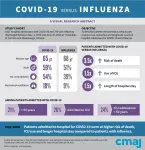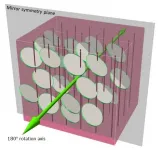INFORMATION:
Tests reveal cybersecurity vulnerabilities of common seismological equipment
2021-02-10
(Press-News.org) Seismic monitoring devices linked to the internet are vulnerable to cyberattacks that could disrupt data collection and processing, say researchers who have probed the devices for weak points.
Common security issues such as non-encrypted data, insecure protocols, and poor user authentication mechanisms are among the biggest culprits that leave seismological networks open to security breaches, Michael Samios of the National Observatory of Athens and colleagues write in a new study published in Seismological Research Letters.
Modern seismic stations are now implemented as an Internet-of-Things (IoT) station, with physical devices that connect and exchange data with other devices and systems over the Internet. In their test attacks on different brands of seismographs, accelerographs and GNSS receivers, Samios and his colleagues identified threats to the equipment that information technology security professionals commonly find in IoT devices.
"It seems that most seismologists and network operators are unaware of the vulnerabilities of their IoT devices, and the potential risk that their monitoring networks are exposed to," said Samios. "Educating and supporting seismologists on information security is imperative, as in most cases unauthorized users will try to gain access through a legitimate user's computer to abuse monitoring networks and IoT devices."
By exploiting these vulnerabilities, a malicious user could alter geophysical data, slow down data transmission and processing, or produce false alarms in earthquake early warning systems, the researchers noted, causing the public to lose trust in seismic monitoring and potentially affecting emergency and economic responses to a seismic event.
Samios and colleagues launched a security assessment of seismic and GNSS devices attached to their own monitoring networks after a security incident at one of their seismic stations. There are several potential weak points in the security of these devices, they noted, including physical security in sometimes remote locations, difficulties and costs of updating security of hardware and software, usage of non-encrypted protocols, and default or easy login credentials.
Using their cybersecurity skills, the researchers tested these weak points using a typical "ethical hacking" process to surveil, scan and gain access to geophysical devices with their default settings. The most notable security issues, they discovered, were a lack of data encryption, weak user authentication protocols and the absence of a secure initial-default configuration
Samios and colleagues were able to demonstrate a launch of a successful denial-of-service or DOS attack against the devices, causing them to be unavailable for the period of the attack, as well as retrieve usernames and passwords for some of the devices.
"Security weaknesses between different devices do not depend on the type of the device, but whether this device uses insecure protocols, outdated software and a potentially insecure default configuration," Samios said. "It is interesting, though, that while these vulnerabilities normally appear on low-cost IoT devices priced at $50 or less, it was also confirmed that they are observed even in seismological and GNSS devices that cost many times more."
As part of their tests, the research team was also able to intercept seismological data transferred through the SeedLink protocol, a data transmission service used by many seismologists. SeedLink may lack some of the necessary encryption and authentication protocols to keep data safe, Samios said. He noted that in a follow-up lab experiment not included in the SRL paper the researchers were able to manipulate waveforms transferred by SeedLink.
"This could potentially generate or conceal alarms on earthquake early warning and seismic monitoring systems, leading to disturbing situations," he said.
While device manufacturers and data transmission services should take steps to improve security functions such as data encryption, Samios said, seismic network operators can work with information security experts to help them develop safer user practices and enhance hardware and software systems.
ELSE PRESS RELEASES FROM THIS DATE:
A language learning system that pays attention -- more efficiently than ever before
2021-02-10
Human language can be inefficient. Some words are vital. Others, expendable.
Reread the first sentence of this story. Just two words, "language" and "inefficient," convey almost the entire meaning of the sentence. The importance of key words underlies a popular new tool for natural language processing (NLP) by computers: the attention mechanism. When coded into a broader NLP algorithm, the attention mechanism homes in on key words rather than treating every word with equal importance. That yields better results in NLP tasks like detecting positive or negative sentiment or predicting which words should come next in a sentence.
The attention mechanism's ...
Temple-Led Team: COVID containment measures in Philly associated with rise in gun violence
2021-02-10
(Philadelphia, PA) - While the COVID-19 pandemic brought most of the country to a standstill in March 2020, Philadelphia trauma surgeons noticed an alarming trend in the incidence of firearm violence. Instead of decreasing with containment measures, firearm-injured patients were presenting at even higher rates to Temple University Hospital and other trauma centers around the city.
A team led by Jessica H. Beard, MD, MPH, FACS, Assistant Professor of Surgery and Director of Trauma Research at the Lewis Katz School of Medicine at Temple University (LKSOM), sought to determine the magnitude of Philadelphia's increase in firearm violence during the COVID-19 pandemic. They also aimed to understand potential causes ...
Definitely not the flu: risk of death from COVID-19 3.5 times higher than from flu
2021-02-10
A new study published in CMAJ (Canadian Medical Association Journal) found that the risk of death from COVID-19 was 3.5 times higher than from influenza.
"We can now say definitively that COVID-19 is much more severe than seasonal influenza," says Dr. Amol Verma, St. Michael's Hospital, Unity Health Toronto, and the University of Toronto. "Patients admitted to hospital in Ontario with COVID-19 had a 3.5 times greater risk of death, 1.5 times greater use of the ICU, and 1.5 times longer hospital stays than patients admitted with influenza."
These ...
Traffic reductions due to COVID-19 boost air quality in some states but not all
2021-02-10
Dramatic decreases in traffic caused by COVID-19 shutdowns improved air quality in car-dependent states but didn't offset additional forms of pollution in other parts of the country.
Those findings by a University of South Florida researcher suggest that while decreasing the number of vehicles on the road is a good first step toward creating cleaner air, additional measures aimed at reducing other sources of air pollution, such as coal plants or industrial factories, must also be considered.
The study, led by Yasin Elshorbany, an assistant professor of atmospheric chemistry and climate change at USF's St. Petersburg campus, was published ...
CWRU researchers uncover biochemical rules between RNA-protein interactions and expr
2021-02-10
CLEVELAND--A team of Case Western Reserve University researchers has found a way to measure key characteristics of proteins that bind to RNA in cells--a discovery that could improve our understanding of how gene function is disturbed in cancer, neurodegenerative disorders or infections.
RNA--short for ribonucleic acid--carries genetic instructions within the body. RNA-binding proteins play an important role in the regulation of gene expression. Scientists already knew that the way these proteins function depends on their "binding kinetics," a term that describes how frequently they latch on to a site in an RNA, and how long they ...
Texas A&M researchers discover energy drinks' harmful effects on heart
2021-02-10
A team of researchers, led by a Texas A&M University professor, has found that some energy drinks have adverse effects on the muscle cells of the heart.
The study, led by Dr. Ivan Rusyn, a professor in the Veterinary Integrative Biosciences (VIBS) Department at the Texas A&M College of Veterinary Medicine & Biomedical Sciences (CVMBS), was published in Food and Chemical Toxicology. In it, researchers observed cardiomyocytes - human heart cells grown in a laboratory - exposed to some energy drinks showed an increased beat rate and other factors affecting cardiac function.
When placed in the context of the human body, ...
Scientists create liquid crystals that look a lot like their solid counterparts
2021-02-10
A team at the University of Colorado Boulder has designed new kinds of liquid crystals that mirror the complex structures of some solid crystals--a major step forward in building flowing materials that can match the colorful diversity of forms seen in minerals and gems, from lazulite to topaz.
The group's findings, published today in the journal Nature, may one day lead to new types of smart windows and television or computer displays that can bend and control light like never before.
The results come down to a property of solid crystals that will be familiar to many chemists and gemologists: Symmetry.
Ivan Smalyukh, ...
Israelis unwilling to risk two-state solution, new RAND report
2021-02-10
Israelis across the political spectrum prefer the status quo to the two-state solution, and Palestinians are only willing to accept a two-state solution that Israelis will be unable to accept, according to a new RAND Corporation report that assesses whether there are any alternative solutions to the conflict that average Israelis and Palestinians would support.
Derived from a series of innovative, structured focus group discussions, the report suggests that the Biden Administration's recent reaffirmation of U.S. policy to support a "mutually agreed two-state solution, one in which Israel lives in peace ...
Solar awnings over parking lots help companies and customers
2021-02-10
The number of people who own electric vehicles (EVs) is increasing, but they face a conundrum: Unlike those who own gasoline-burning cars, EV owners can't just pop down to the corner gas station for a fill-up. Particularly in rural areas, charging stations can be few and far between.
Joshua Pearce, Richard Witte Endowed Professor of Materials Science and Engineering and professor of electrical and computer engineering at Michigan Technological University, hopes to change that.
In a model outlined in a paper in the journal Renewable Energy, Pearce and his co-author, graduate student Swaraj Sanjay Deshmukh, note the untapped potential of retail parking lot solar photovoltaic awnings.
The study investigates the energy-related benefits ...
Plant-based magnetic nanoparticles with antifungal properties
2021-02-10
A team of researchers from Immanuel Kant Baltic Federal University obtained magnetic nanoparticles using sweet flag (Acorus calamus). Both the roots and the leaves of this plant have antioxidant, antimicrobial, and insecticide properties. The extract of sweet flag was used as a non-toxic reagent for the manufacture of coated particles. The authors of the work also showed the efficiency of the new nanoparticles against several types of pathogenic fungi that damage cultivated plants. A technology developed by the team provides for the manufacture of nanoparticles from a cheap plant-based raw material and reduces the harmful effect of reagents on the environment.
Because of their unique properties, nanoparticles are used in many areas, from medicine to oil production. ...




